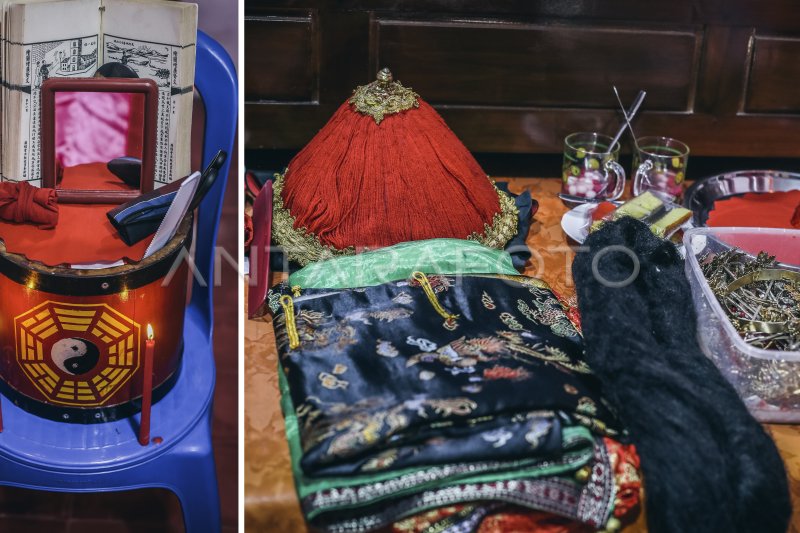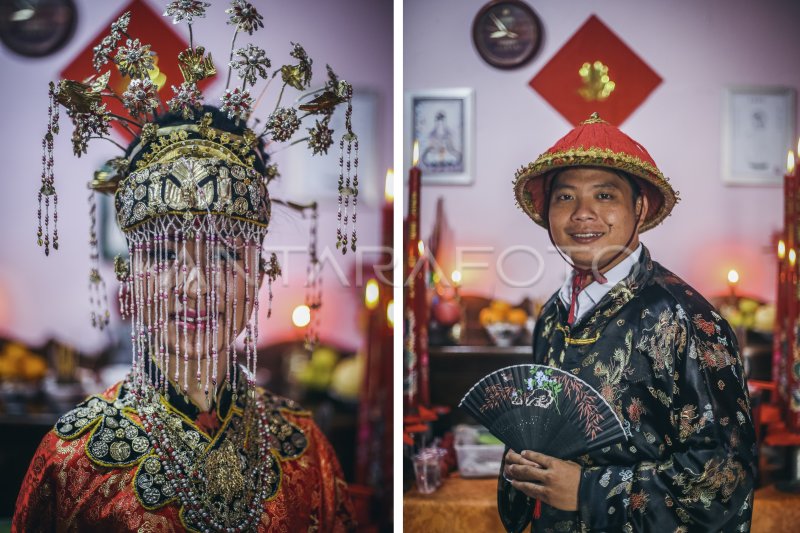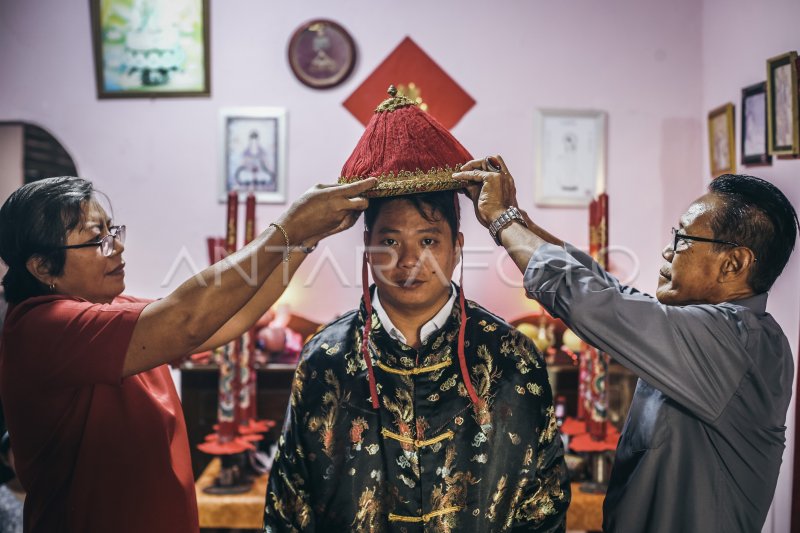The morning light highlights Panongan area, Tangerang District, Banten, adorns the sakral event of the Chinese traditional wedding ceremony, which is also known as the name of Cio Tao.
Aroma dupa is radiating to the air as if fused with a melancholy melancholis music tool. Visible two bruises Ongnih and Suanda run in the charm of traditional Chinese clothing similar stories in the kungfu film adorning the silver screen.
Both parents flatten look like two waxes that continue to light, illuminate the way for their children. With compassion, they prepare everything to make sure that the sacred event runs smoothly.

Artman plays traditional music in traditional Chinese wedding custom event Fort or Cio Tao in Panongan, Tangerang, Banten.

Photo collage fixture for traditional Chinese wedding custom event Fort or Cio Tao in Panongan, Tangerang, Banten.
In full sense of tolerance, look at special dining tables with dishes for Muslims as well as dining tables for non-diversified Islam. In the center of modernization, Ongnih and Suanda are two among Chinese residents of the Fort who still keep the Cio Tao tradition to knit the past in hope in the future.
In everyday life based on Buddhist beliefs, they remain faithful to maintain and treat with the honor of the values and traditions that have been abandoned by the ancestors. Although it has adopted new beliefs, the award for the legacy and the ancestors of Konghucu is still an integral part in their spiritual and cultural life, becoming a bridge between the past and the present time in a continuing spiritual journey.
Now the wedding is run by using the Cio Tao tradition is rare. It is related to the more commonly the choice of simpler and practical weddings, where many couples prefer to hold a shortening ceremony in vihara and directly proceed with a reception event.

The photo of the collage of Chinese residents of Ongnih (left) and Suanda (right) while holding traditional Chinese weddings of the Fort or Cio Tao in Panongan, Tangerang, Banten.

The old man welcomes to worship in the traditional Chinese wedding event of Fort or Cio Tao in Panongan, Tangerang, Banten.
The Tradition of Cio Tao, which was first a wedding ritual based on the religious beliefs of Konghucu, has now changed the role and meaning to formal wedding ceremony only. The change occurs along with many Chinese residents of the Stronghold who switched faith into Buddhism.
Although this tradition has a close relation to religious beliefs, along with the time and change the confidence of many people, Cio Tao is then more used as a symbol and cultural heritage that is preserved and preserved by the Chinese community of the Fort, regardless of the religious background that they are currently anut.
The tradition remains appreciated and kept full of respect to their ancestor’s heritage, although it has no longer been closely linked to the aspects of religious beliefs.

The old man focuses on wearing traditional Chinese wedding custom shirts Fort or Cio Tao to nurtur men in Panongan, Tangerang, Banten.

The old man contemplates wearing traditional Chinese wedding custom shirts Fort or Cio Tao to the bride at Panongan, Tangerang, Banten.
Photos and text: Rivan Awal Lingga

The condition of sawer of the family for the bride couple in the traditional Chinese wedding event of Fort or Cio Tao in Panongan, Tangerang, Banten.

The old man welcomes to worship in the traditional Chinese wedding event of Fort or Cio Tao in Panongan, Tangerang, Banten.

The two contemplates to do one of the traditional Chinese wedding customs process of Fort or Cio Tao in Panongan, Tangerang, Banten.

The two contemplates to do one of the traditional Chinese wedding customs process of Fort or Cio Tao in Panongan, Tangerang, Banten.

Give the man to do one of the traditional Chinese wedding customs process of Fort or Cio Tao in Panongan, Tangerang, Banten.

The photo of the collage of Chinese residents of Ongnih (left) and Suanda (right) while holding traditional Chinese weddings of the Fort or Cio Tao in Panongan, Tangerang, Banten.
Editor : Prasetyo Utomo